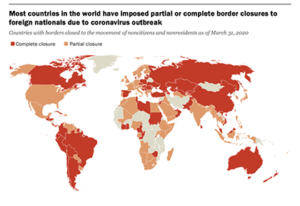COVID-19 crisis has closed borders across the world
More than ninety per cent of people across the globe now live in countries with COVID-19 travel restrictions, according to the Washington-based think tank the Pew Research Centre.
The movement of people across borders has come to a stop in much of the world as countries shut their borders to visitors – and often their own citizens – in response to the COVID-19 crisis
 Now, 93 per cent of the world’s population, or 7.2 billion people, live in countries with restrictions on people arriving from other countries who are neither citizens nor residents, such as tourists, business travellers and new immigrants, the Pew Centre says.
Now, 93 per cent of the world’s population, or 7.2 billion people, live in countries with restrictions on people arriving from other countries who are neither citizens nor residents, such as tourists, business travellers and new immigrants, the Pew Centre says.
Roughly 3 billion people, or 39 per cent, live in countries with borders completely closed to noncitizens and non-residents, according to a Pew Research Center analysis of border closure announcements and United Nations population data.
These travel and entry restrictions vary among the world’s most populous countries, but they all come at a time of reduced travel as airlines have slashed routes and tourism has all but stopped.
China, home to more than 1.4 billion people, closed its borders to foreigners other than some diplomatic and scientific personnel starting on March 28.
India, with a population of nearly 1.4 billion, has largely closed its borders by suspending visas and requiring a two-week quarantine for all arrivals regardless of citizenship.
The United States, where around 330 million live, has closed its borders to people who are neither citizens nor residents of the US who arrive from China and from many countries in Europe, including the UK and Ireland.
In Japan, where this summer’s Tokyo Olympics have been put off until the northern summer of 2021, travellers may not enter the country if they have been in countries with widespread coronavirus outbreaks. All arrivals, including Japanese citizens, must self-quarantine for 14 days if they have visited a larger list of countries affected by the outbreak, including several European nations.
Some nations are also banning entry by asylum seekers. The US has said it will turn away potential asylum seekers at its southern border with Mexico as part of a move to close ports of entry to nonessential traffic.
Canada has said it won’t process asylum claims from those who enter by land from the US.
In Europe, many asylum hearings and services have been suspended.
The Pew Centre says the world’s 272 million international migrants may have difficulty returning to their home countries in the near future due to increasing travel restrictions and fewer commercial airline flights. About 36 per cent are from countries that have implemented near-complete border closures to non-citizens and non-residents. Another 45% of the world’s migrants are from countries that have seen at least a partial border closure to travellers.
Meanwhile, countries are trying to keep borders open to the flow of goods.












